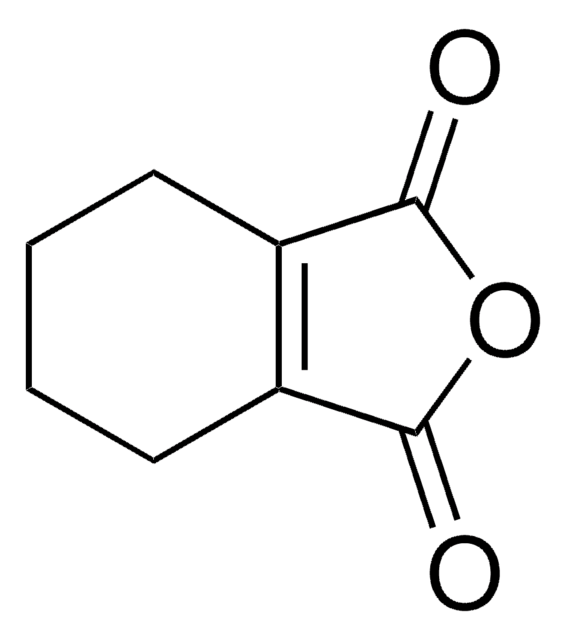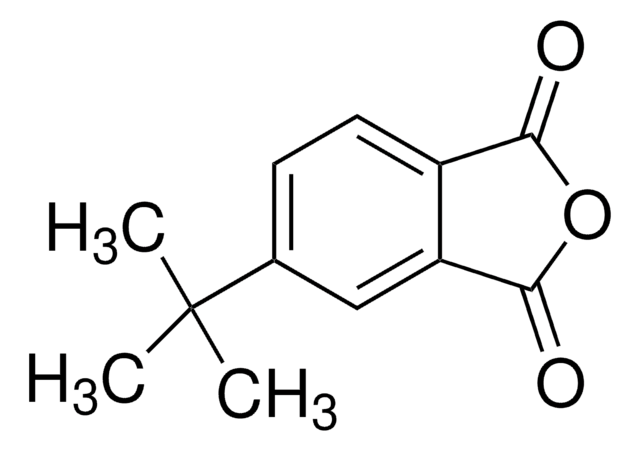149934
Hexahydro-4-methylphthalic anhydride, mixture of cis and trans
96%
Sinónimos:
4-Methyl-1,2-cyclohexanedicarboxylic anhydride
About This Item
Productos recomendados
Quality Level
assay
96%
refractive index
n20/D 1.477 (lit.)
density
1.162 g/mL at 25 °C (lit.)
SMILES string
CC1CCC2C(C1)C(=O)OC2=O
InChI
1S/C9H12O3/c1-5-2-3-6-7(4-5)9(11)12-8(6)10/h5-7H,2-4H2,1H3
InChI key
FKBMTBAXDISZGN-UHFFFAOYSA-N
¿Está buscando productos similares? Visita Guía de comparación de productos
Application
- Limonene-based epoxy: Anhydride thermoset reaction study: This research explores the thermosetting reactions of limonene-based epoxy using hexahydro-4-methylphthalic anhydride, illustrating its application in creating environmentally friendly polymers (Couture et al., 2018).
- Metallocene catalysts for the ring-opening co-polymerisation of epoxides and cyclic anhydrides: Discusses the application of metallocene catalysts in ring-opening copolymerization involving hexahydro-4-methylphthalic anhydride, relevant for developing new polymeric materials (Shaw et al., 2022).
- Evaluation of Natural and Modified Castor Oil Incorporation on the Melt Processing and Physico-Chemical Properties of Polylactic Acid: Explores the use of natural oils modified with hexahydro-4-methylphthalic anhydride to enhance the properties of polylactic acid, a study significant in biodegradable plastics (Darie-Niță et al., 2022).
- Synthesis, characterization, and recycling of bio-derivable polyester covalently adaptable networks for industrial composite applications: Investigates the use of hexahydro-4-methylphthalic anhydride in creating adaptable networks for industrial applications, enhancing the sustainability of materials (Wang et al., 2024).
- Epoxidized linseed oils based networks. Case of thermal degradation: Discusses the thermal degradation of networks made from linseed oils cross-linked with hexahydro-4-methylphthalic anhydride, which is pivotal in understanding the stability and life span of bio-based polymers (Richaud et al., 2019).
signalword
Danger
hcodes
Hazard Classifications
Eye Dam. 1 - Resp. Sens. 1 - Skin Sens. 1
Storage Class
10 - Combustible liquids
wgk_germany
WGK 1
flash_point_f
235.4 °F - closed cup
flash_point_c
113 °C - closed cup
ppe
Eyeshields, Faceshields, Gloves, type ABEK (EN14387) respirator filter
Elija entre una de las versiones más recientes:
¿Ya tiene este producto?
Encuentre la documentación para los productos que ha comprado recientemente en la Biblioteca de documentos.
Los clientes también vieron
Nuestro equipo de científicos tiene experiencia en todas las áreas de investigación: Ciencias de la vida, Ciencia de los materiales, Síntesis química, Cromatografía, Analítica y muchas otras.
Póngase en contacto con el Servicio técnico











